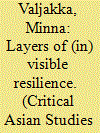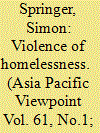|
|
|
Sort Order |
|
|
|
Items / Page
|
|
|
|
|
|
|
| Srl | Item |
| 1 |
ID:
120855


|
|
|
|
|
| Publication |
2013.
|
| Summary/Abstract |
The case of "homelessness in Iran" presents empirical evidence to demonstrate "how a small media organization affects and changes social discourse." The study investigates how the Iranian Students News Agency (ISNA) embodied the view of a news agency as having a role not only in the coverage of events, but also as an active agent of social change through discursive interventions. The process by which ISNA reconstructed homelessness and its empirical consequences is compatible with the five accepted stages labeled by Blumer. Homelessness represents the different ways in which ISNA has intervened in the social discourse in Iran: foregrounding a social issue, thematizing a discourse and problematizing social issues in order to open up a new kind of discourse.
|
|
|
|
|
|
|
|
|
|
|
|
|
|
|
|
| 2 |
ID:
155416


|
|
|
|
|
| Summary/Abstract |
This article explores how a devolved government in a small country, faced with external constraints beyond its immediate control, can deploy policy resources to shape a distinctive approach to public services. We analyse recent homelessness policy in Wales using the NATO (Nodality, Authority, Treasure, Organisation) typology of tools of government proposed by Hood and Margetts, and show how this can be applied usefully to understand the choices that governments must make in conducting relationships with other institutions. We conclude that a combination of Nodality and Authority provide powerful resources for a subnational government which has only limited formal powers and fiscal autonomy.
|
|
|
|
|
|
|
|
|
|
|
|
|
|
|
|
| 3 |
ID:
188575


|
|
|
|
|
| Summary/Abstract |
Building on a critical gendered approach at the intersection of arts, women, and homelessness, this article calls attention to the structured layers of (in)visibilities of female agency, existence, and resilience. The arts have a special place and importance in civil society formation in relation to homelessness in Japanese cities today, so the aim is to elucidate the significant but understudied role of women in enhancing varied forms of resilience in the urban environment. Arts, activism, and, in particular, art activism on socio-political issues in Asian cities are typically perceived as methods of resistance against local and national governments, whereas their crucial contribution to urban resilience often remains unrecognized. By investigating the emergent forms of interdisciplinary arts in Tokyo and Osaka that are aimed at sustainability in less-privileged living conditions, this article contributes to the growing field of studies acknowledging how these circumstances are brought about not only by economic ruptures but also by gendered socio-structural and cultural factors. By recognizing the intricate parameters of the varied artistic practices, a more nuanced understanding of the gendered urban resilience in maintaining communities, neighborhoods, and cities can be gained.
|
|
|
|
|
|
|
|
|
|
|
|
|
|
|
|
| 4 |
ID:
171906


|
|
|
|
|
| Summary/Abstract |
This article examines the plight of homeless peoples in Phnom Penh, Cambodia as a consequence of their enmeshment in a new logic of urban governance being rolled out by city officials and municipal planners. The widespread adoption of neoliberal economics has resulted in a globalised version of urban entrepreneurialism, to which Phnom Penh is a participant. The (re)production of enterprise zones, cultural spectacles, waterfront development, and privatised forms of local governance all reflect the powerful disciplinary effects of interurban competition as cities aggressively engage in mutually destructive place‐marketing policies. Against this neoliberal backdrop, the ongoing pattern of violence utilised by municipal authorities against homeless peoples in Phnom Penh is part of a gentrifying process that the local government has dubbed a ‘beautification’ agenda. Of particular concern is how city officials have begun actively promoting the criminalization of the urban homeless and poor through arbitrary arrests and illegal detention, holding them in so‐called re‐education or ‘rehabilitation’ centres. Yet these centres are not what they seem. Such euphemisms attempt to mask the systemic abuse of marginalised peoples who are deemed to present Phnom Penh in a negative light and are consequently unwanted on the streets of the capital city.
|
|
|
|
|
|
|
|
|
|
|
|
|
|
|
|
|
|
|
|
|